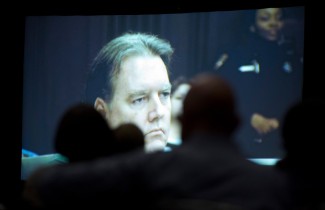Documentary makes ‘stand your ground’ laws personal
A still of Michael Dunn from the documentary “3½ Minutes, 10 Bullets.” Photo by Earnie Grafton.
On Black Friday of 2012, four teenagers stopped at a gas station in Jacksonville, Florida, to buy gum and cigarettes and got into an argument with a stranger about their music. Only three survived.
That was the beginning of the story told by 3½ Minutes, 10 Bullets, a documentary that followed the high-profile murder trial of Michael Dunn. Dunn is the white man who was tried and eventually convicted for shooting into a car full of unarmed black teenagers in Jacksonville, Florida, killing 17-year-old Jordan Davis. He claimed self-defense under Florida’s “stand your ground” law.
The film was presented by the ABA’s National Task Force on Stand Your Ground Laws at the midyear meeting in San Diego. Task force co-chair Leigh-Ann Buchanan—as well as members Joshu Harris, an assistant district attorney at the Norfolk County District Attorney’s Office in Massachusetts, and Steven Jansen, chief operating officer for the Association of Prosecuting Attorneys—also spoke at the event and led a town hall-style discussion of the documentary, the laws and solutions.

Photo by Earnie Grafton.
3½ Minutes follows the Dunn trial in detail, interspersing footage of the trial itself with news and security camera recordings, home movies from Davis’ childhood, and interviews of witnesses, friends and family. During the trial, Davis’ three friends—all of whom survived the shooting—told a markedly different story about the confrontation from the one Dunn told.
A climactic moment of the film comes when Rhonda Rouer, Dunn’s fiancée, gives testimony that contradicts his. Nonetheless, the jury in Dunn’s first trial hung on the charge of first-degree murder for killing Davis; Dunn was convicted on that charge in a retrial.
The movie also spends time on the discussions of race underlying the Dunn trial (and the contemporaneous trial of George Zimmerman, who was acquitted of murdering Trayvon Martin). Dunn tells Rouer in a recorded jailhouse phone call that he’s not racist, but numerous people in Jacksonville disagree. Protesters gather outside the courthouse daily with signs saying things such as: “I Could Be Next.” Davis’ mother, Lucia McBath, cries as she tells the filmmakers that a not-guilty verdict would “tell a whole race of people they don’t matter.”

Task force co-chair Leigh-Ann Buchanan. Photo by Earnie Grafton.
“The sense of injustice the film provokes is why we started the stand-your-ground task force,” Buchanan said.
In fact, racial disparities are one of the reasons the task force’s report (PDF), issued in September, concluded that stand-your-ground laws do more harm than good. The report also says the laws are correlated with an increase in homicides, don’t solve any clear problem with self-defense laws and undermine victims’ rights. Buchanan noted that homicides went up in states with the laws even though homicides generally went down during that period.
Buchanan noted that, thus far, all efforts to repeal the laws have foundered. The task force nonetheless recommends that states repeal or amend such laws. It also recommends that the ABA support a public education campaign addressing the incorrect belief that the laws justify any shooting in a public place.
The task force report’s cover shows a picture of a hoodie, or hooded sweatshirt—a nod to Martin, who was faulted by Fox News host Geraldo Rivera for wearing such a sweatshirt. Buchanan added that the date of the event, Feb. 5, was chosen because it was Martin’s birthday. He would have been 21.
• See what people are saying about #ABAMidyear on Twitter, and follow along with our full coverage of the 2016 ABA Midyear Meeting.
• See the full schedule of events. There are mobile apps available for Apple and Android users.




